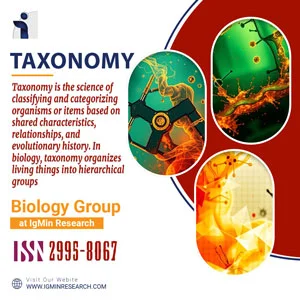Open Access Policy refers to a set of principles and guidelines aimed at providing unrestricted access to scholarly research and literature. It promotes the free availability and unrestricted use of research outputs, enabling researchers, students, and the general public to access, read, download, and distribute scholarly articles without financial or legal barriers. In this response, I will provide you with an overview of the history and latest resolutions related to Open Access Policy.
About
Advance Biological Classification Through Taxonomy Research
Taxonomy plays a crucial role in understanding and organizing biological diversity. At IgMin Research, we encourage scientists, researchers, and academicians to contribute their valuable findings to our taxonomy open-access journals. We are committed to publishing high-quality, peer-reviewed work that enhances global knowledge in systematics, classification, and biodiversity.
Whether you're classifying a new species or proposing revisions to existing taxonomic hierarchies, our platform is designed to support your publishing journey.
Why Choose IgMin for Your Taxonomy Publication?
- Streamlined Taxonomy Journal Submission process with global visibility
- Opportunity to Publish taxonomy research that meets COPE and ICMJE standards
- Trusted platform among Taxonomy open-access journals for rapid and transparent peer review
Submit your manuscript today and take part in shaping the future of biological classification.
Biology Group (2)
Open Access Policy refers to a set of principles and guidelines aimed at providing unrestricted access to scholarly research and literature. It promotes the free availability and unrestricted use of research outputs, enabling researchers, students, and the general public to access, read, download, and distribute scholarly articles without financial or legal barriers. In this response, I will provide you with an overview of the history and latest resolutions related to Open Access Policy.

Why publish with us?
Global Visibility – Indexed in major databases
Fast Peer Review – Decision within 14–21 days
Open Access – Maximize readership and citation
Multidisciplinary Scope – Biology, Medicine and Engineering
Editorial Board Excellence – Global experts involved
University Library Indexing – Via OCLC
Permanent Archiving – CrossRef DOI
APC – Affordable APCs with discounts
Citation – High Citation Potential
Which articles are now trending?
Research Articles
- Microgravity Employment in Archaeology – Available Experience and Future Perspectives
- Current Oscillations and Resonances in Nanocrystals of Narrow-gap Semiconductors
- A Comprehensive Methodology for Assessing the Business Reputation of Industrial and Production Personnel
- Gaussian-Transform for the Dirac Wave Function and its Application to the Multicenter Molecular Integral Over Dirac Wave Functions for Solving the Molecular Matrix Dirac Equation
- EB Naevi-like Lesion in Infant Bullous Pemphigoid
- Lifestyle and Well-being among Portuguese Firefighters
Advertisement










